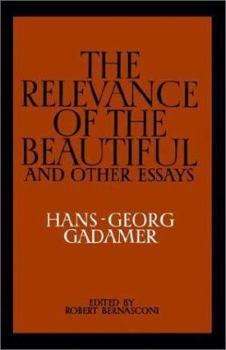The Relevance of the Beautiful and Other Essays
Select Format
Select Condition 
Book Overview
This volume explores some of the more important of Hans-Georg Gadamer's extensive writings on art and literature. The principal text included is 'The Relevance of the Beautiful', Gadamer's most... This description may be from another edition of this product.
Format:Paperback
Language:English
ISBN:0521339537
ISBN13:9780521339537
Release Date:March 1987
Publisher:Cambridge University Press
Length:220 Pages
Weight:0.60 lbs.
Dimensions:0.6" x 6.0" x 8.1"
Customer Reviews
2 ratings
The hermeneutic circle explains how art can be `world disclosive'
Published by Thriftbooks.com User , 15 years ago
I read this book for a graduate seminar on the philosophy of art. The relationship that people have with language is an idea that philosophers who study "hermeneutical aesthetics" such as Hans-Georg Gadamer, have been exploring for decades. Gadamer, who was a student of Martin Heidegger, defines Hermeneutical aesthetics as not a theory of art per se, but more a set of practical guideposts for enhancing one's encounter with art. The goal of hermeneutical aesthetics is not to arrive at a concept of art but to deepen our experience of art. In hermeneutical aesthetics, theory is deployed to deepen contemplation of artworks by the audience rather than to categorize their nature. Thus, in the artform of literature, Gadamer's commitment to the linguistic nature of understanding also commits him to the view of understanding as essentially a matter of conceptual articulation between the author and the reader. This does not rule out the possibility of other modes of understanding, but it does give primacy to language and conceptuality in hermeneutic experience. Thus, Gadamer in his essay "On the Contribution of Poetry to the Search for Truth" in his book "The Relevance of the Beautiful and Other Essays," agrees with Wimsatt and Beardsley who created the "Intentional Fallacy" notion that the "success" of a literary text is not to be found in the author's intent or motivations, but what has been communicated in the text itself. For Gadamer, a successful text has to answer the same question as any other form of communication. Is it successful in conveying "...the universal nature of all speech--namely, the fact that what the word evokes is there." For example, Gadamer in his essay "Composition and Interpretation" makes a hermeneutic distinction between the linguistic characteristic traits of people speaking to one another and what he calls "the experience of poetry," which he believes has its own "language." In regards to poetic language, Gadamer argues that when young lovers write poems we all understand that there are powerful emotional forces behind the intent of the poem and we do not have to ask about the author's intentions and motivations behind her verse. However, in regards to serious poetry, Gadamer argues that the reader does not question to whom or why the author is communicating. "The poem does not stand before us as a thing that someone employs to tell us something. It stands there equally independent of both the reader and poet. Detached from all intending, the word is complete in itself." Furthermore, Gadamer uses a unique argument for the importance of interpretation over authorial intent by hypothesizing that literary composition has a closer relationship with the practice of interpretation than any other artistic medium. "As far as poetry and poetic composition are concerned, it is not uncommon to find the practice of interpretation and artistic creation united in one and the same individual." One prominent poet that fit
Ars Critica
Published by Thriftbooks.com User , 19 years ago
In The Relevance of the Beautiful, Gadamer hopes to justify the ways of art to modern man. He's answering Plato's banishment of the poets in The Republic, and every other such banishment, including Hegel's, who claimed that "art is a thing of the past" on the grounds that art re-establishes our sense of transcendence and order, that it "bridges the chasm between the ideal and the real," establishes our sense of "play," and otherwise enlarges our experience of life, communally, spiritually, culturally, and individually. It teaches us to go beyond ourselves. German philosopher, Hans-Georg Gadamer, famed student of Heidegger and author of the seminal Truth and Method, offers this phenomenological defense. As translated by Robert Bernasconi, Gadamer writes such a poetic and aphoristic prose that anyone with a moderate background in the arts can read it, as well as philosophers, artists, and critics. This essay is useful for a number of reasons: it gives articulate defenses-or condemnations-of translation, modern music (both pop and experimental), kitch, religious art, and historical painting. It is further particularly useful to me in that the grounds on which he makes many of his defenses mirror those of P.B. Shelley in "A Defense of Poetry."




